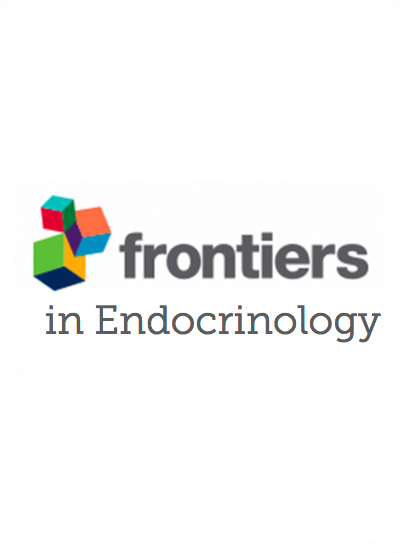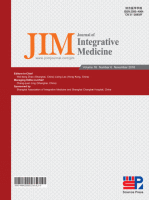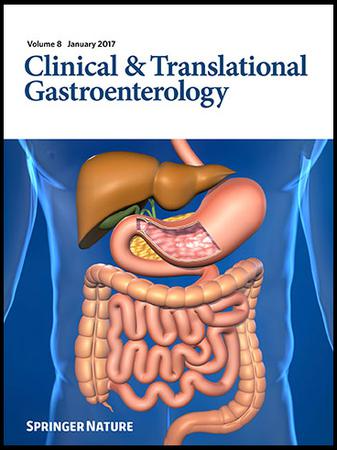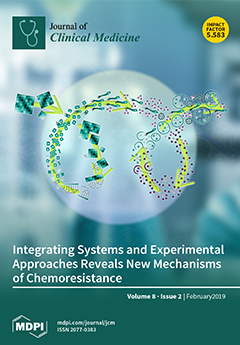Jia Wei Xiao Yao San
How to submit an article:
- Registered users can submit any published journal article that has a unique DOI (Digital Object Identifier) name or link to Research Hub.
- For example, you can paste the full DOI link:
https://doi.org/10.1109/5.771073or just the DOI name:10.1109/5.771073into the field above and click submit. - The person who is first to submit a valid article to Research Hub will forever be credited for it, and every article submission earns you +6 Research Points.
Also known as: Dan Zhi Xiao Yao San
Published research studies are articles that present the findings of original research that has undergone a peer-review process and has been made publicly available in scholarly journals, books or other media.

Effectiveness and potential mechanism of Jiawei-Xiaoyao-San for hyperthyroidism: a systematic review
2023 Sep 13 Frontiers in Endocrinology Ma W, Zhang X, Zhao R, Tang Y, Zhu X, Liu L, et al.
Systematic Review Jia Wei Xiao Yao SanJia Wei Xiao Yao San could potentially enhance the effectiveness of antithyroid drugs in treating hyperthyroidism especially in symptom relief and side effect reduction.

Exploration of the Molecular Mechanism of Danzhi Xiaoyao Powder in Endometrial Cancer through Network Pharmacology
2022 Jun 13 Frontiers in Pharmacology Lanyu Li, Lukai Yang, Fang Liu, Jinfeng Qu
In conclusion, Danzhi Xiaoyao powder (DXP) might inhibit the proliferation of endometrial cancer (EC) cells via apoptosis. Furthermore, DXP-induced inhibition of EC development might involve RAS/RAF/MEK/ERK pathway.
Network Pharmacology Jia Wei Xiao Yao San
Canonical Chinese medicine formula Danzhi-Xiaoyao-San for treating depression: A systematic review and meta-analysis
2022 Apr Journal of Ethnopharmacology Wang XL, Feng ST, Wang YT, Zhang NN, Wang ZZ, Zhang Y
This systematic review and meta-analysis approved an efficient role of Danzhi-Xiaoyao-San (DXS) in improving depression in clinical randomized controlled trials.
Systematic Review Meta-Analysis Jia Wei Xiao Yao San
Evaluation of Therapeutic Effect and Prognosis of Danzhi Xiaoyao Powder Combined with Photodynamic Therapy in the Treatment of Rose Acne
2022 Mar 11 Frontiers in Pharmacology Xinjian Yu, Ni Zhang, Jing Jin, Xuwen Yin, Jing Luo
Danzhi Xiaoyao Powder combined with photodynamic therapy (PDT) to treat rose acne is effective, can quickly control inflammatory papules and inflammatory erythema, effectively improve the clinical symptoms of patients, and reduce adverse reactions.
Jia Wei Xiao Yao San
Metabolomic characteristics of spontaneously hypertensive rats under chronic stress and the treatment effect of Danzhi Xiaoyao Powder, a traditional Chinese medicine formula
2022 Jan Journal of Integrative Medicine Chen S, Hu J, Lu D, Liu H, Wei S
These findings expose the metabolomic disturbances induced by chronic stress in Spontaneously hypertensive rats (SHRs) and suggest an innovative treatment for this disorder.
Animal Study Stress Jia Wei Xiao Yao SanResearch insights are moderated by the Research Hub team and offer an at-a-glance overview of interesting research findings.

2023 Frontiers in Endocrinology
Jia Wei Xiao Yao San could potentially enhance the effectiveness of antithyroid drugs in treating hyperthyroidism especially in symptom relief and side effect reduction.
Systematic Review
Effectiveness and potential mechanism of Jiawei-Xiaoyao-San for hyperthyroidism: a systematic review
Ma W, Zhang X, Zhao R, Tang Y, Zhu X, Liu L, et al.

2020 Clinical and Translational Gastroenterology
Jia Wei Xiao Yao Wan showed an improvement in gastrointestinal symptoms for patients with functional dyspepsia who resisted conventional treatments.
Randomised Controlled Trial
An Herbal Formulation of Jiawei Xiaoyao for the Treatment of Functional Dyspepsia: A Multicenter, Randomized, Placebo-Controlled, Clinical Trial
Chen G, Feng P, Wang S, Ding X, Xiong J, Wu J, et al.

2018 Journal of Clinical Medicine
Traditional Chinese Medicine, particularly Jia Wei Xiao Yao San and Xiang Fu, is widely utilized in Taiwan for managing Polycystic ovary syndrome symptoms.
Xiang Fu
Investigation on the Use of Traditional Chinese Medicine for Polycystic Ovary Syndrome in a Nationwide Prescription Database in Taiwan
Liao WT, Chiang JH, Li CJ, Lee MT, Su CC, Yen HR
Review Articles
Review articles summarise and critically evaluate the current state of research on a specific topic or field by synthesising multiple primary research studies.

Effectiveness and potential mechanism of Jiawei-Xiaoyao-San for hyperthyroidism: a systematic review
2023 Sep 13 Frontiers in Endocrinology Ma W, Zhang X, Zhao R, Tang Y, Zhu X, Liu L, et al.
Systematic Review Jia Wei Xiao Yao SanJia Wei Xiao Yao San could potentially enhance the effectiveness of antithyroid drugs in treating hyperthyroidism especially in symptom relief and side effect reduction.

Canonical Chinese medicine formula Danzhi-Xiaoyao-San for treating depression: A systematic review and meta-analysis
2022 Apr Journal of Ethnopharmacology Wang XL, Feng ST, Wang YT, Zhang NN, Wang ZZ, Zhang Y
This systematic review and meta-analysis approved an efficient role of Danzhi-Xiaoyao-San (DXS) in improving depression in clinical randomized controlled trials.
Systematic Review Meta-Analysis Jia Wei Xiao Yao SanClinical Trials
Clinical trials are research studies that involve people and are conducted to evaluate the safety and efficacy of new treatments or interventions, such as drugs, medical devices, or behavioural therapies.
Study Protocols
Published study protocols are detailed plans that outline the objectives, methodology, statistical analyses, and organisation of a research study that have been made publicly available for others to review and use as a reference.
Presentation Slides

Systematic Review
Jia Wei Xiao Yao San could potentially enhance the effectiveness of antithyroid drugs in treating hyperthyroidism especially in symptom relief and side effect reduction.
Ma W, Zhang X, Zhao R, Tang Y, Zhu X, Liu L, Xu M, Wang G, Peng P, Liu J, Liu Z

Randomised Controlled Trial
Jia Wei Xiao Yao Wan showed an improvement in gastrointestinal symptoms for patients with functional dyspepsia who resisted conventional treatments.
Chen G, Feng P, Wang S, Ding X, Xiong J, Wu J, Wang L, Chen W, Chen G, Han M, Zou T, Li L, Du H

Traditional Chinese Medicine, particularly Jia Wei Xiao Yao San and Xiang Fu, is widely utilized in Taiwan for managing Polycystic ovary syndrome symptoms.
Liao WT, Chiang JH, Li CJ, Lee MT, Su CC, Yen HR
Executive Summary
Write an executive summary in the form of a blog article on the topic of "Research into Chinese medicine treatment for Jia Wei Xiao Yao San" summarising the research below and using language that can be easily understood by patients and avoiding medical jargon using a professional and caring tone of voice.
Write an executive summary in the form of a blog article on the topic of "Researched Chinese medicine treatments for Jia Wei Xiao Yao San" summarising the research below in an objective and easy to understand way, and using language that can be easily understood by patients. Group the article into Chinese medicine treatments first, followed by nutrition and other treatments. Avoid using medical jargon and use a professional and caring tone of voice.
Write me a concise but easy to understand executive summary on the topic of "Chinese medicine treatments for Jia Wei Xiao Yao San" based on the following research that I will give you. Your summary should be 2 paragraphs long in Australian English spelling and include references to the studies.
A Systematic Review published in 2023 in the journal Frontiers in Endocrinology found that Jia Wei Xiao Yao San could potentially enhance the effectiveness of antithyroid drugs in treating hyperthyroidism especially in symptom relief and side effect reduction. To evaluate this claim, a systematic and comprehensive dive into eight databases and three trial registries up until May 2023 was performed. From this, Randomized Controlled Trials (RCTs) were earmarked and subjected to further analysis using the Review Manager software application (RevMan 5.4) and Stata 14.0. Assessments of bias in these studies were conducted using the Cochrane risk of bias tool 1.0, while the GRADE tool was implemented for overall quality assessment. In addition, any case reports utilizing JWXYS in singular use and relevant pharmacological studies were summarized for further understanding. This investigation involved 13 RCTs with a total of 979 participants. It was found that, when compared with standalone antithyroid drug treatment, the combination of JWXYS and antithyroid drugs resulted in improved control of thyroid hormones, better efficacy in treating traditional Chinese medicinal syndrome, lesser incidence of goiter, fewer side effects, and lower levels of thyroid stimulating hormone receptor antibodies. Furthermore, dosage reduction of antithyroid drugs when used in combination with JWXYS also led to fewer side effects. However, when compared to antithyroid drugs treatment in a single trial, JWXYS showed mixed results indicating it is not recommended for use as a standalone treatment except in patients intolerant to antithyroid drugs. The evaluation of three case reports highlighted that patients may opt for traditional Chinese medicine only as an alternative due to severe side effects and recurrent relapses. Three other pharmacological studies showed the potential of JWXYS in restoring Th17/Treg balance, regulating thyroid cell growth, and alleviating oxidative stress in liver.
A Randomised Controlled Trial published in 2020 in the journal Clinical and Translational Gastroenterology found that Jia Wei Xiao Yao Wan showed an improvement in gastrointestinal symptoms for patients with functional dyspepsia who resisted conventional treatments. The researchers approached 144 individuals who had functional dyspepsia and had previously rejected standard therapies like proton pump inhibitors, H2 blockers, and Helicobacter pylori collision treatment. These individuals, located across nine different sites in China, were randomly selected to either a Jiawei Xiaoyao pill or a placebo, which they had to take for four weeks. The main measurement used in the study was the change in the individuals' total Gastrointestinal Symptom Score from the beginning of the test period to the end. Additionally, the team used the results of various medical tests for safety outcomes. Out of 141 patients that qualified for statistical analysis, the group taking the Jiawei Xiaoyao pill demonstrated a more significant decrease in their Gastrointestinal Symptom Score compared to the ones on placebo, suggesting the pill was beneficial for their symptoms. However, the Jiawei Xiaoyao pill group did not show a significant improvement in their Hamilton Depression Scale or Hamilton Anxiety Scale scores, suggesting the pill might not have significant impact on depression or anxiety. The total number of adverse events reported were more in the Jiawei Xiaoyao pill group than the placebo group. But the superiority of the Jiawei Xiaoyao pill in improving gastrointestinal symptoms in functional dyspepsia patients that resist standard therapies is evident.
A published in 2018 in the journal Journal of Clinical Medicine found that Traditional Chinese Medicine, particularly Jia Wei Xiao Yao San and Xiang Fu, is widely utilized in Taiwan for managing Polycystic ovary syndrome symptoms. The study administered a comprehensive survey through the Taiwan National Health Insurance Program database to scrutinize the use of TCM in women diagnosed with PCOS between 1997 and 2010. Single herbs and herbal formulas, their utilization patterns, and the top commonly prescribed items among them, were analyzed to gauge the extent and pattern of TCM usage. The analysis of the survey results revealed that a significant majority, around 89.22%, of women who were newly diagnosed with PCOS, sought TCM therapy. The single herb, Xiang-Fu, and the herbal formula, Jia-Wei-Xiao-Yao-San, emerged as the most commonly used TCM treatments. Furthermore, it was observed that the top five commonly prescribed single herbs and herbal formulas showed potential in treating symptoms associated with PCOS.
Moderation Tools
Topic
Sign In
Users not signed in are limited to viewing the 5 most recent items of content.